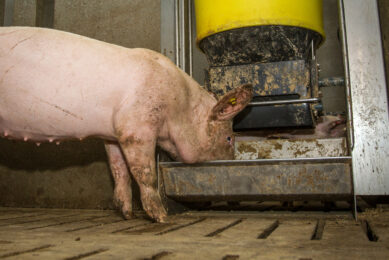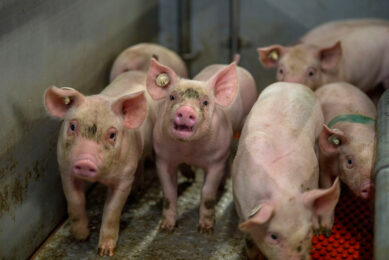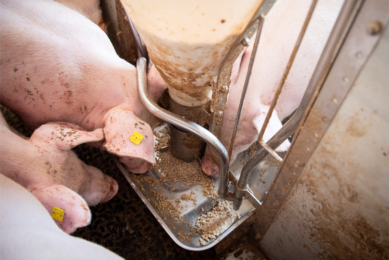Effect of mycotoxins on gut development

Animal immune systems are modulated during early life due to stimulus given through diet, microbiota colonisation and gastrointestinal mucosa. To what degree, and how, can mycotoxin exposure during early life modulate the immune system of young animals?
The gastrointestinal tract as a whole comprehends an integrated system, composed by an effective structure, the functionality of the gastrointestinal barrier, host interaction with gastrointestinal microbiota, efficient digestion and absorption, active immune status and diet. Beyond the functions related to nutrient intake and metabolism, the digestive tract plays a significant role in regulating epithelial and immune functions, facilitating normal biological functioning and homeostasis in both gastrointestinal tract and the body. The ‘developmental origins of the health and disease’ paradigm remarks that nutritional and environmental stimulation during critical periods of growth has a permanent effect on the structure and (or) function of the cell populations, organs systems, or homeostatic pathways. Conway (cited in Knudsen, 2012) proposed that there be 3 major components of gut health, namely the diet, the mucosa and the commensal flora. Moreover, nutrition is accredited with having a powerful effect on the long-term modulation of the adaptive immune system. Gut health, for instance, is a complex concept, and it is at present, an ill-defined notion.
Mycotoxins and the immune system
Mycotoxins are defined as secondary fungal metabolites, toxic to humans and animals. Worldwide, mycotoxins have a significant impact on human and animal health, economies and international trade, making feed contamination by mycotoxins an area of great concern. However, how do mycotoxins relate to the immune system? In literature, there are several reports of mycotoxins negatively effecting it.
Intestinal epithelial cells are an important component of the innate immune system, the barrier between animal tissues and the outside environment. Studies have shown that mycotoxins increase the permeability of the intestinal epithelial layer in numerous species (e.g., swine and poultry), which can result in uncontrolled leakage of foreign material into the animal. Mycotoxins are mentioned to be able to affect intestinal cell viability and to reduce cell proliferation, thereby reducing reparation of the intestinal epithelium. Also, the production of cytokines by intestinal epithelial cells might be affected. Biologically, the mycotoxins may lead to acute (diseases with high morbidity and mortality) and chronic (disorders with reduced animal productivity) problems. Different mycotoxins target different organs, showing various toxic effects. High exposure to mycotoxins cause cytotoxicity, which might induce primary biochemical lesions and impact on early cellular functions causing toxic cell injury or cellular deregulation, while low exposure may affect various tissues and organs functionalities (e.g. gastrointestinal tract, liver, kidney and nervous, reproductive and immune systems).

Early-life nutrition
More specifically when naming the mycotoxins and their effects, aflatoxins might impair both the innate and adaptive immune system, and this last is modulated, among other factors, by nutrition during early-life. Pigs exposed to aflatoxins showed an altered inflammatory response. Another study reported the reduced synthesis of pro-inflammatory and anti-inflammatory cytokines in weaning piglets fed low doses of aflatoxins. Trichothecenes (type B, including Deoxynivalenol – DON) is reported to up and down regulate immune functions disrupting intracellular signalling within leukocytes. DON, for instance, might stimulate or suppress the immune system depending on the dose, the frequency and duration of the exposure. Moreover, various immune cells (e.g., macrophages, B and T lymphocytes and natural killer cells) are susceptible to DON, while DON has been demonstrated to alter cytokine secretion, increase cell apoptosis and suppress the antibody response to vaccination. Fumonisins (B1) is reported to modify T helper and T helper 2 cytokine balance in pigs, comparable to an impaired humoral response. Regarding Zealerone (ZEA), this might increase the synthesis of inflammatory cytokines when the intestinal epithelial cells are exposed to it. ZEA is pointed to modulate intestinal cell immune and (or) cellular repair pathways. Co-exposure of mycotoxins has also been investigated, but not at the same extent to individual exposure. A study with DON and fumonisins B1 showed synergetic effects on the immune system.
Variability of mycotoxins
Furthermore, the effects of the mycotoxins do not only rely on interactions with organ and tissues after contact and interaction with the gastrointestinal tract. The variability of the mycotoxins should be taken into consideration, as some of them may pass through the first sections and interact with the microbiota further in the colon, which could also be affected by them. It is reported that the mycotoxin ochratoxin (OTA) reduced acetic, butyric and total short-chain fatty acid concentrations in the human colon, indicating that OTA is capable of disrupting the microbiota metabolism. In the same study, it was reported that a strain of Lactobacillus reuteri (a beneficial bacteria for immune response) was eliminated from the colon microbiota. It is important to highlight that microbiota is one of the adaptive immune system modulators.
The effect of the modulation of the immune response in pigs by mycotoxins increases the susceptibility and severity of infectious diseases and impairs the effectiveness of vaccines. This is of particular note for animal husbandry because during infection, nutrients are used for the immune system instead of growth and development.
References available on request











